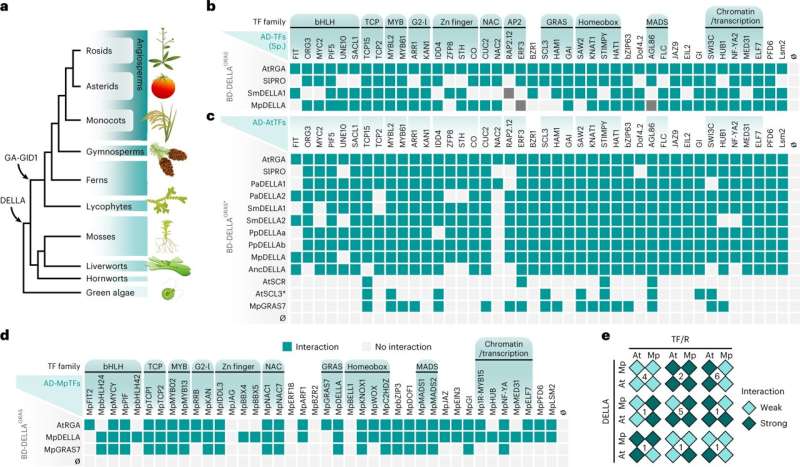This article has been reviewed according to Science X's editorial process and policies. Editors have highlighted the following attributes while ensuring the content's credibility:
fact-checked
peer-reviewed publication
trusted source
proofread
DELLA proteins could hold key to the next Green Revolution

A family of 'promiscuous' proteins found in all land plants is responsible for many different plant functions, despite remaining relatively unchanged for over 450 million years.
New findings, published in Nature Plants and New Phytologist reveal new knowledge about how DELLA proteins regulate how much a plant grows, when germination occurs and how plants deals with threats such as drought and disease. The key is not in DELLA proteins' ability to mutate over time, but instead in their ability to interact with dozens of different transcription factors, the proteins responsible for decoding DNA.
Understanding the mechanisms which underpin the functions of DELLA proteins can help crop scientists design new plant proteins to produce crops with better resilience and higher yields, similar to the selective breeding technologies that started the Green Revolution in the 1960s. Many of the original Green Revolution breeding strains themselves possessed DELLA proteins with altered function.
The studies were carried out by scientists at the Institute of Molecular and Cellular Biology of Plants (IBMCP), in Spain, and the School of Biosciences at the University of Birmingham, in the UK. Dr. Juliet Coates, of the University of Birmingham, said, "By understanding how the activity of these proteins changed over time, we can understand more about how it might be possible to tweak and engineer plants that are better adapted to our changing environment."
To find out how DELLA proteins changed over the 450 million years since plants first appeared on land, the researchers studied the mosses and liverworts, which are the plants likely to most closely resemble those early pioneering species.
Scientists already know that DELLA proteins in modern flowering plants are regulated by a plant hormone called gibberellin, which changes the levels of DELLAs in response to environmental conditions.
In the new studies they were able to show that, rather than having only simple interactions, the DELLA proteins' range was just as complicated in early plants, but also different from the interactions studied in detail in modern crops such as wheat or rice. Moreover, these interactions were available whether or not the gibberellin hormone was present. They were also able to identify a core set of interactions, relating to defense and responses to low oxygen levels, that were common to all DELLA proteins.
Co-author, Dr. Miguel Ángel Blázquez, of the IBMCP, said, "A very important area of work in gibberellin biotechnology is trying to obtain varieties or chemical compounds that allow us to achieve the desired goals without the side effects. Understanding how DELLA proteins have evolved in nature over millions of years helps us to design new strategies to generate new DELLA variants with the desired functions."
More information: Asier Briones-Moreno et al, DELLA functions evolved by rewiring of associated transcriptional networks, Nature Plants (2023). DOI: 10.1038/s41477-023-01372-6
Alexandros Phokas et al, DELLA proteins regulate spore germination and reproductive development in Physcomitrium patens, New Phytologist (2023). DOI: 10.1111/nph.18756
Journal information: New Phytologist , Nature Plants
Provided by University of Birmingham



















